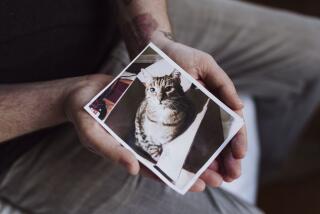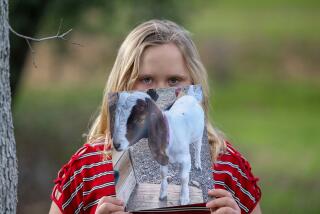Verit Blames Losses on a Fur Deal Gone Awry
- Share via
Some people think paying up front for a product, and taking delivery later, is a time-honored way of doing business. Verit Industries’ stockholders might think otherwise.
Verit, a Sun Valley wholesaler and manufacturer, recently announced a $606,000 loss for its fiscal third quarter ended March 31, and a $726,000 loss on sales of $8.1 million for the first nine months of its fiscal year. As a result, Verit’s shares, which trade on the American Stock Exchange, now languish 79% below their level of two years ago.
Why the losses? Verit blamed them mostly on a lawsuit in which the company alleged that it paid $580,000--up front--for a shipment of furs in late 1986, and then never got delivery. The lawsuit was filed against a Tustin fur dealer, Anthon’s Furs, and its president Carl Anthon Allen. Anthon’s Furs has since filed for Chapter 11 bankruptcy protection.
Verit wanted the furs to resell to retailers. Led by Lavere G. Lund, Verit’s chairman and its biggest stockholder with a 41% stake, Verit specializes in such wholesaling of merchandise, particularly consumer electronic products and “close-out” items, all of which accounted for about half of Verit’s $25.9 million in fiscal 1987 sales. The other half came from Verit’s production of stereo loudspeakers, which are sold through its Wald Sound subsidiary.
Verit, founded in 1967, began selling close-out items in late 1985 and, in the year ended June 30, 1986, the new business helped the company earn $876,000 on sales of $23.3 million. But earnings tumbled to $137,000 the following year as profit margins narrowed on Verit’s close-out products. And now Verit is suffering a dismal fiscal 1988, in part because of the fur mess.
Verit filed a lawsuit in March, 1987, in Los Angeles Superior Court to recover the $580,000 from Anthon’s for alleged breach of contract and fraud, plus an additional $1 million in punitive damages.
But there’s another side to the story. Anthon’s claims that the furs were not missing at all, that it did nothing wrong and that Verit’s loss of the $580,000 is its own fault.
Moreover, Anthon’s has filed a countersuit against Verit and others, alleging that they were responsible for forcing the fur dealer into bankruptcy proceedings one month after Verit filed its lawsuit.
The case amounts to “negligent mismanagement by the management of Verit Industries,” said Joey P. Moore, Anthon’s lawyer.
It is also a case Verit is not eager to discuss. In a statement announcing its latest financial results, Verit said the losses stemmed from the lawsuit, but did not say how. Here are two possibilities: Verit simply wrote off the $580,000, or its legal costs produced the loss.
The company’s top two officers--Lund and David A. Swanson, vice president for finance--did not return several telephone calls requesting elaboration. An independent Verit director, Sidney Horowitz, also did not respond to calls.
According to court documents, Verit, through its Wald Sound unit, ordered the furs in late 1986 as part of a plan to resell them to the Telephone Auction, a television-shopping network based in San Jose. Instead of shipping all the furs to Wald’s doorstep, Anthon’s would hold the furs and then ship individual garments to viewers who ordered them from the Telephone Auction’s broadcasts.
Wald prepaid for a total of $1.36 million worth of furs from Anthon’s, and about $780,000 were delivered to customers, according to Verit’s court records. However, around January, 1987, Anthon’s refused to deliver the remaining $580,000 worth of furs Wald had paid for, Verit alleged.
According to Lund’s court statements, Wald and Anthon’s then agreed that instead of holding the furs for the Telephone Auction, Anthon’s would hold them for another telemarketing company, Entertainment Marketing of Houston.
But, Wald alleges, the furs still were not forthcoming. Then Wald demanded that Anthon’s deliver the furs directly to Wald. “Allen refused,” Lund said in his statement.
Anthon’s, meanwhile, has a different version of the story.
Moore said the Telephone Auction wanted to buy $1.36 million worth of furs from Anthon’s, but did not have the cash. So it asked Verit to finance the deal and Verit agreed, he said.
“The documentation was made to reflect that Wald Sound was purchasing the furs, but there was never any intent to sell furs to Wald Sound,” Moore said. “Wald Sound has never bought any furs from Anthon’s with respect to this $1.4 million transaction.”
So why did Wald send the money to Anthon’s? “They were merely acting as a bank” and would profit from the investment by taking a percentage of payments made by the Telephone Auction’s customers when they ordered the furs, Moore said.
In addition, there were no restrictions on how the money was to be used by Anthon’s, and the money was not backed by any collateral of the Telephone Auction, Moore said. So, after the Telephone Auction indicated that it would be doing lots of business with Anthon’s, Anthon’s--which had been in business only a few months--expanded its operations with help from Wald Sound’s money, he said.
But around November, 1986, the Telephone Auction began to run into financial problems and filed for Chapter 11 bankruptcy protection in May, 1987. Anthon’s, still expanding and paying lots of overhead, was “waiting and waiting for orders to come in, and nothing is coming in,” Moore said.
Wald then wanted Anthon’s to start shipping the furs to Entertainment Marketing, the other telephone marketer, instead of the Telephone Auction, but “there’s been no evidence” that the Telephone Auction had agreed to the switch, Moore said. So Anthon’s balked.
Moreover, Anthon’s itself was trying to sign up Entertainment Marketing as a customer and viewed Wald as an intruder.
Anthon’s is suing Verit, alleging that it interfered with its contract with the Telephone Auction and its effort to enlist Entertainment Marketing’s business. The suit also alleges that Verit helped damage Anthon’s business. The fur dealer is seeking unspecified damages and up to $10 million in punitive damages.
Thomas M. Norminton, Verit’s lawyer in the fur case, said in a telephone interview that Verit denies all of Anthon’s allegations. But he said he could not elaborate on the financial losses, and he declined comment on the specifics of the lawsuits.
The litigation may yet pay off for Verit, but the suits already have helped damage Verit’s income statement and stock price. The stock closed Monday at $4.25, and it remains 79% below the $20 price it reached in mid-1986.
As a consequence, the value of Lund’s stake in Verit has plummeted to $1.35 million during that period from $6.15 million.
More to Read
Inside the business of entertainment
The Wide Shot brings you news, analysis and insights on everything from streaming wars to production — and what it all means for the future.
You may occasionally receive promotional content from the Los Angeles Times.











